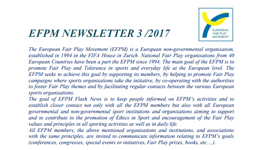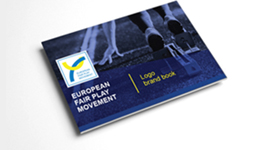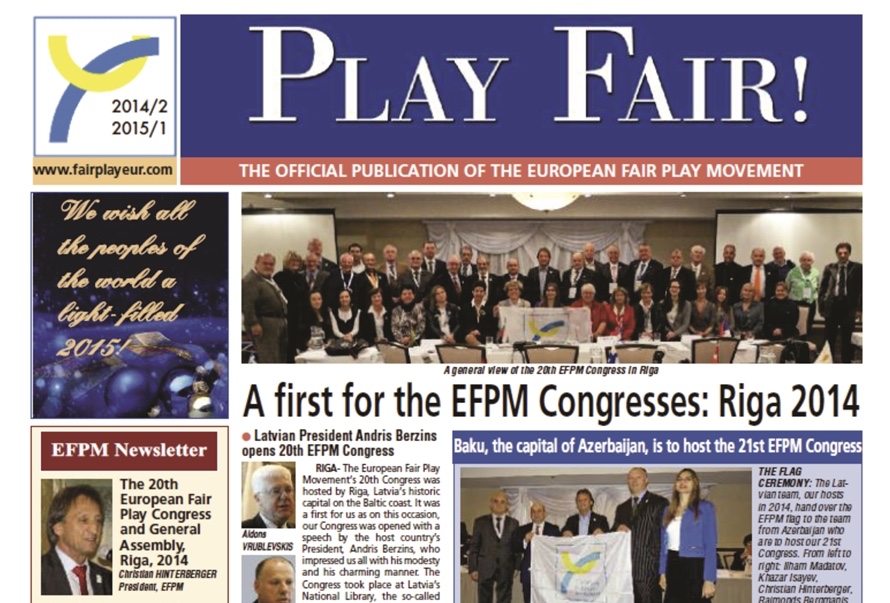Statutes
STATUTES
GENERAL DISPOSITIONS
TITLE I: Denomination, Head Office and Official Languages, Aims and Corporate Purpose, Duration
Article 1: Denomination
1.1. The name of the Association is the “European Fair Play Movement”, also referred to below as EFPM
1.2. The EFPM was founded at the Founding Assembly held in Switzerland on May 27/28, 1994 by the representatives of 14 European countries, who decided to create this organisation as a European body focused in working for Fair Play
1.3. The EFPM is a non-governmental, non-profit, non-political, autonomous organisation, that represents the common interests of its members, being the fulfillment, development and promotion of the aims of EFPM.
1.4. The use of the EFPM Logo/Symbol requires the formal permission of the EFPM Executive Committee and has to follow the EFPM Brand Book.
Article 2: Head Office and Official Languages
2.1. The head office is located in the territory of the Brussels-Capital Region.
2.2. The official languages of the EFPM are French and English.
All internal documents and correspondence are in English. Congresses, meetings and sessions shall also be held in English.
The language for legal obligations is French.
2.3. A branch office may be established in another country by decision of the Executive Committee.
2.4. The law of the registration office governs the obligations of the EFPM
2.5. In case of interpretation, the French version shall prevail.
Article 3: Aims and Corporate Purpose
3.1.The EFPM promotes and develops Fair Play in sport, education and everyday life, primarily in Europe. The EFPM reflects a philosophy of life, abiding by universal ethical values, seeking to create in the spirit of Fair Play and based on the educational value of good example through sport a better world, where pleasure is found in sport with tolerance and respect for competitors.
3.2. In order to achieve its aims, the EFPM
3.2.1. helps to organise Fair Play initiatives and supports sport and educational organisations when they plan to launch Fair Play campaigns,
3.2.2. facilitates regular contacts between sports and educational organisations, in order to support their Fair Play goals, as well as their sports events,
3.2.3. encourages and supports the promotion of ethics, gender equality, inclusion, good governance in sport as well as initiatives against doping in sport and any other relevant manipulation,
3.2.4. promotes the exchange of information between members,
3.2.5. collaborates with the media and public authorities, in order to promote and disseminate Fair Play matters,
3.2.6. represents the common EFPM position within non-governmental and governmental organisations and Fair Play bodies dealing with sports and ethical issues,
3.2.7. organises congresses, seminars and any other appropriate events for the promotion of Fair Play,
3.2.8. promotes and organises Fair Play Awards.
3.3. The EFPM may use directly or indirectly all means necessary to achieve its corporate purpose.
In particular, it may acquire, rent and lease all properties and real rights, hire personnel, enter into legally valid contracts, collect funds and receive subsidies, engage in commercial activities, in short, carry out or have carried out all activities that pursue its corporate purpose.
3.4. The main activities that the association intends to carry out are the following:
3.4.1. Organise promotional days, meals, shows, festivals, meetings, courses, refresher courses, exams, conferences, gatherings,
3.4.2. create and/or produce training programmes, regulations, any kind of visual promotion;
3.4.3. Buy, sell or resell promotional material, equipment (clothing or sports equipment), programmes or courses (in the form of syllabi, videos, e-learning), food and drink at events, vehicles
3.4.4. To carry out lobbying activities, recruitment of members and seek sponsors ;
3.4.5. Renting, building and/or fitting out office, training, storage or performance spaces, temporarily or permanently;
3.4.6. Organising individualised education
3.4.7. Organising transport of people to various organisations; organising transport of materials;
3.4.8. To publish newsletters, bulletins, magazines and books.
Article 4: Duration
The association is established for an indefinite period. It may be dissolved at any time
TITLE II: MEMBERS
Article 5: Categories of Members
Members of the EFPM can be:
5.1. Full members
Full members are the:
- Corporate Members
- Associate Members
5.2. Adherent members
Adherent members are the :
- Supporting Members
5.3. Honorary members
Article 6: Definition and Rights of Full Members
6.1. “Corporate members” are European national sport entities and sport organisations with aims coinciding with the aims of the EFPM.
Each European country is to be represented by only one sport entity or organisation, which has the right to speak and vote in the EFPM General Assemblies (10 votes each) as well as to present candidatures for posts on the EFPM Executive Committee, given that it fulfils the obligations set forth in the present statutes, including the payment of the annual fee before the respective General Assembly.
New EFPM Corporate Members have to pay the fee starting from the following year after their affiliation and onwards.
6.2.“Associate Members” are international sport entities and organizations which have established a mode of bilateral cooperation with EFPM (joint venture, memorandum of understanding or similar) in the field of Sport and Fair Play.
The Associate Members have the right to speak and vote at the EFPM General Assemblies (one vote each).
Article 7: Definition and Rights of Adherent Members
“Supporting Members” are persons, bodies, institutions, organisations and / or commercial enterprises that support the aims and goals of the EFPM through financial or other contributions.
The supporting members have the right to speak but not to vote at the General Assembly.
Article 8: Definition and Rights of Honorary Members
“Honorary Members” are individuals and personalities having distinguished themselves in the promotion or in acts of Fair Play.
Nominations for such memberships shall be presented by the Executive Committee to the General Assembly and the acceptance of said nominations must be approved by at least a two-thirds majority of the cast votes.
The Honorary Members have the right to speak and vote at the EFPM General Assemblies (one vote each).
Article 9 : Conditions of Admission
9.1. Each European country may be represented by only one national organisation as an EFPM corporate member.
9.2. If two or more national bodies within a country claim membership, it will be given to the one which is approved by the respective National Olympic Committee.
9.3. No more than one European or International body governing one and the same sport shall be allowed membership.
9.4. If two or more European or International sport bodies governing one and the same sport claim membership, the priority will be given to the one which is approved by the respective European or International Sport Federation.
9.5. Applications for membership shall be submitted in writing to the General Secretary, including the appropriate supporting documents as per the requirements of Article 7.
9.6. The admission of any member is subject to approval by the General Assembly, following the recommendation of the Executive Committee. The admission or not of a new member shall be announced by the General Secretary, immediately after the end of the voting procedure.
9.7. The admission of any member starts from the year after the approval of the General Assembly.
Article 10 : Resignation and Exclusion of Members
10.1. All members are free to withdraw from the EFPM at any time by sending their resignation in writing to the General Secretary.
10.2 A resignation shall be deemed to have been made by
- a corporate member who does not pay the membership fee due within one month of the reminder sent to him/her by email
- a full member or adherent member who no longer fulfils the conditions for admission, e.g. dissolution of a corporate member
10.3. The exclusion of a full, adherent or honorary member is pronounced by the General Assembly.
The exclusion of the member must be mentioned in the convocation. The member in question must be informed by the President of the Executive Committee of the reasons for his exclusion. The member has the right to be heard at the General Assembly and may be assisted by a lawyer.
A member may only be excluded by the General Assembly if at least two thirds of the members are present or represented at the general assembly and by a two-thirds majority of the votes of the members present or represented.
The ballot shall be secret and invalid or blank votes as well as abstentions shall not be taken into account in the numerator or denominator.
The sanction of exclusion taken against the member shall be notified to him/her by registered letter and shall be entered in the register of members.
10.4. Any EFPM Corporate member which has resigned or has been expelled from the EFPM and wishes to rejoin shall have to pay the membership fee for the re-entry year.
Article 11: Register of Full Members
11.1. The EFPM shall keep a register of full members in accordance with Article 9.3 of the Companies and Associations Code.
11.2. The register shall be kept in electronic form.
11.3. The right to consult the electronic register of full members shall be granted upon expressed request to the President of the Executive Committee and without moving the register.
Article 12: Responsibilities
Members shall not be held liable for commitments made on behalf of the EFPM.
Article 13: Membership Fees
13.1. The annual membership fee for corporate members should not exceed a maximum of EUR 520,00.
13.2. The amount of the annual membership shall be fixed by the Executive Committee
TITLE III : Governing Bodies
The governing bodies of the EFPM are:
- the General Assembly
- the Executive Committee
Article 14: General Assembly
14.1. Composition
The General Assembly is the sovereign authority of the EFPM. It is made up of delegates appointed officially by all EFPM members and is held once a year.
14.2. Authority
The General Assembly shall have the powers expressly granted to it by the Belgian law or these statutes.
A decision of the General Assembly is required for :
- Amendments of the statutes
- Approval of the annual accounts and the budget
- Appointment and dismissal of Executive Committee officers and the fixing of their remuneration in cases where a remuneration is allocated to them
- appointment and dismissal of Auditor(s) and the fixing of his/their remuneration
- The discharge of the Executive Committee officers and Auditors, and if applicable the introduction of an action by the Association against the Executive Committee officers and Auditors
- the admission and exclusion of members
- Voluntary dissolution of the Association
- The transformation of the ASBL into an AISBL, into a cooperative company approved as a social enterprise and in a cooperative society approved as a social enterprise
- Making or accepting the free contribution of a universality
- All cases where the statutes require it.
14.3. Functioning
14.3.1. At least one General Assembly must be held each year during the first half of the year following the closing of the accounts.
14.3.2. The General Assembly is convened by the President, by means of written notices to all members.
The General Secretary shall send a detailed Agenda at least two months before the event date, including the date and the relevant schedule.
This agenda will be preliminary and must include the request for approval of:
- the minutes of the previous General Assembly,
- the auditor’s report and accounts for the expiring period,
- the budget for the coming period,
- the proposed level of the annual fee and
- items proposed by the Executive Committee if any
Further proposals from EFPM members, as well as nominations for candidatures in case of elections, must be received by the General Secretary at least thirty (30) days before the opening date of the General Assembly, in order to be included in the final agenda.
14.3.3. The General Assembly may consider only items, which are included in the final agenda and may settle all cases that have not been anticipated by the present Statutes.
14.3.4. All EFPM members are entitled to attend to the General Assembly, represented by a maximum of two delegates, who have the right to speak but only one shall have the right to vote. Corporate Members have ten votes each, Associate and Honorary Members have one vote each, Supporting Members have no vote.
14.3.5. An EFPM member is entitled to be represented by another EFPM member by means of a written proxy. An EFPM member can carry no more than two proxies, valued in accordance with the identity of the represented member (honorary or corporate).
14.3.6. The General Assembly will only open if a quorum of forty per cent (40%) of the total number of the corporate members is present, except in cases provided for by law.
14.3.7. All votes for elections, affiliations or exclusions of EFPM members and/or questions of particular importance shall be held by secret ballot. Voting for general issues shall be performed by a show of hands or by a roll call, unless the President or at least one quarter of the EFPM members that are present call for a vote by ballot.
14.3.8. All decisions shall be taken by a simple majority of votes, unless the statutes or the law specify otherwise. In the event of a tied vote, the proposal shall be rejected.
14.3.9. Representatives of countries, organisations or personalities that are not members of EFPM, may attend the General Assembly and other EFPM activities as observers, subject to approval by the Executive Committee. Observers shall have the right to speak only upon invitation and with the authorisation of the President of the General Assembly.
14.3.10. Candidates for the post of the President and the post of an Executive Committee officer must be nominated by the corporate member organisation to which the candidate is associated.
Members of the Executive Committee may re-stand for election on their own free will.
All applications for candidature shall be submitted to the EFPM General Secretary not later than thirty (30) days prior to the commencement of the General Assembly.
14.3.11. A simple majority of votes is required for the election of Executive Committee officers. If no candidate for a given post receives this majority, a second vote shall be taken between the candidates who received the most votes in the first ballot. In the event of a further tied vote, the decision shall be made by drawing lots.
14.3.12. The General Assembly shall be chaired by the President of the EFPM. In the absence of the President, the General Assembly shall be chaired by the duly appointed Vice President.
14.3.13. The General Secretary shall draft the minutes of the General Assembly and shall distribute them to all EFPM members within two months of the conclusion of the General Assembly.
The minutes of each General Assembly shall be signed by the President and the Secretary General or in their absence, the persons designated for this purpose These minutes shall be kept in a register at the registered office of the Association.
Any member may request extracts signed by the President.
Third parties with an interest may request extracts on matters that concern them signed by the President.
Article 15: Extraordinary General Assembly
15.1. An Extraordinary General Assembly shall be held if so decided by the General Assembly or the Executive Committee or upon written request to the General Secretary by one fifth of the EFPM corporate members.
In the latter case, the Executive Committee shall convene the Extraordinary General Assembly within 21 days of the request to convene. The Extraordinary General Assembly shall be held at the latest within 40 days of the request.
15.2. The venue for an Extraordinary General Assembly as well as its date shall be determined by the Executive Committee. The relevant agenda shall indicate among others the reasons for holding an Extraordinary General Assembly.
15.3. The procedures of an Extraordinary General Assembly shall be the same as those of an ordinary General Assembly and the decisions to be taken shall accordingly have equal validity.
Article 16: Remote General Assembly
16.1. General Assemblies are in principle held in person. In case of extraordinary circumstances such as force majeure or pandemic, the Executive Committee may decide to hold a remote general meeting
16.2. In such a case, the participation in the General Assembly may be realised by video or teleconference using electronic means of communication provided by the EFPM.
The invitation contains the information necessary to participate in the video or teleconference as well as a description of the procedure to be followed for remote participation.
The chosen means of communication allows the participants:
1) to verify the identity and status of the other participants;
2) to take direct, simultaneous and uninterrupted cognisance of the discussions during the meeting;
3) to take part in the deliberations and ask questions;
4) to exercise their right to vote on all the points on which the meeting is called upon to rule.
All convened persons may participate electronically in the general meeting.
Any technical difficulties which prevented or disrupted participation by electronic means shall be noted in the minutes of the general meeting.
Members who participate in the General Assembly must meet the quorum and majority requirements and are considered to be (virtually) present at the venue of the General Assembly
Article 17: Executive Committee
17.1. The Executive Committee, operating on a voluntary basis, shall conduct the organisational, administrative and financial activities of the EFPM, shall decide about the organization of the European Fair Play Congresses, shall announce the Fair Play Awards and shall initiate the amendments and/or modifications of the Statues following the approval of the General Assembly.
17.2. The Executive Committee is elected for a four-year term of office by the relevant electoral General Assembly and shall have no more than nine (9) members, including the President, two Vice Presidents, the General Secretary, the Treasurer and four Members.
17.3. The Executive Committee officers must originate from different corporate member organisations. If there are more candidates nominated by one corporate member, the priority will be given to the one with the majority of votes.
17.4. The Executive Committee shall elect from among its Members the two Vice Presidents, the General Secretary and the Treasurer.
17.5. The Executive Committee shall meet at least twice a year with the presence of a quorum of at least fifty per cent (50%) of the Executive Committee Members.
17.6. Decisions shall be taken by open vote and simple majority. In the event of a draw, the President shall have the casting vote. In the absence of the President the casting vote goes to the appointed Vice President.
17.7. An officer of the Executive Committee loses his/her office by resigning or by final and irreversible judgement or conviction by state or sports authorities for actions that contradict the aims and the ideals of Fair Play.
17.8. If due to resignation or any other reason a post in the Executive Committee becomes vacant, the Executive Committee may co-opt a replacement, who shall serve until the next General Assembly, which will approve or not said co-option. If the co-option is approved, the co-opted member shall complete the term of office for which the original member had been elected.
17.9. If five or more members of the Executive Committee resign, the next General Assembly – Ordinary or Extraordinary, whichever is more convenient – shall elect anew the whole Executive Committee and the President. The new Executive Committee shall conduct its duties accordingly, completing the term of office for which the original Executive Committee had been elected.
17.10. The decisions of the Executive Committee shall be recorded in a register of minutes signed by the President and the Secretary General or in their absence, the persons designated for this purpose
This register shall be kept at the registered office where the full members may consult it on written request, stating the reasons, addressed to the Secretary General, but without moving the register.
Article 18: The President
18.1. The President shall be elected directly by the General Assembly.
18.2. The President chairs the General Assembly and Executive Committee Meeting, directs the EFPM and represents the EFPM in all relevant rights and duties.
Article 19: Vice Presidents
19.1. The Executive Committee shall appoint two of its members as Vice Presidents, who shall in turn represent the EFPM whenever the President is not available.
19.2. The Vice President to replace the President whenever needed shall be nominated by the President.
Article 20: General Secretary
20.1. The Executive Committee shall appoint one of its elected Members as General Secretary.
20.2. The General Secretary shall conduct the administration of the EFPM, implement the decisions of the General Assembly and the Executive Committee, and maintain relations with EFPM members as well as with third parties.
The General Secretary shall be responsible for drafting the Minutes of the sessions of the General Assembly and of the Executive Committee and shall keep their approved texts.
20.3. The General Secretary shall maintain orderly files and archives and shall handle all EFPM correspondence.
Article 21: Treasurer
21.1 The Treasurer shall keep orderly accounts of all financial transactions, approved by the Executive Committee.
21.2 The Treasurer has to be consulted on all financial matters and shall assist at all financial negotiations.
21.3 The Treasurer must present at each meeting of the Executive Committee an up-to- date Report of the financial situation/status of the EFPM.
21.4 The Treasurer has to pay invoices, which shall be signed by the Treasurer and also by either the President or the General Secretary.
21.5 The Treasurer shall make available, for the benefit of the General Assembly, the annual report of the financial situation of EFPM to the General Assembly.
21.6 The Treasurer shall prepare the balanced accounts for each fiscal year and shall submit them to the Board of Auditors together with the relevant documentation at least two months prior to the date of the General Assembly
Article 22: Board of Auditors
22.1. The Board of Auditors consists of three (3) EFPM members and has a term of office of four (4) years. The members of the Board of Auditors are elected by the General Assembly from among the representatives of the EFPM members, attending the Assembly. The members of the Board of Auditors nominate from among their number a member to serve as Chairman of the Board.
22.2. The Board of Auditors shall examine the accounts submitted by the Treasurer together with the relevant documentation and the annual report of the financial statements and will report their conclusions and recommendations on the state of the accounts to the General Assembly.
Article 23: Day-to-day Management
23.1. The General Secretary is responsible for the day-to-day management.
23.2. The day-to-day management shall include acts and decisions, which do not exceed the daily life of the association as well as acts and decisions, which, either because of the minor interest they represent, or because of their urgent nature, do not justify the intervention of the Executive Committee.
Article 24 - General representation of the Association
24.1. Legal actions, both as plaintiff and defendant, shall be brought or supported in the name of the Association by the President and the Secretary General.
They shall act jointly.
24.2. Acts which commit the Association, other than day-to-day management, shall be signed jointly, unless specially delegated by the Executive Committee, by the President, the General Secretary and the Treasurer who shall not be required to justify their powers to third parties.
TITLE IV: Bye-laws
Article 25: Bye-Laws
The EFPM, in addition to the present Statutes, shall recognise Bye-Laws. The Bye-Laws may be formed and amended by the Executive Committee and shall in no case contradict the provisions of the present Statutes.
TITLE V: Accounts and Budget
Article 26: Fiscal Year
The fiscal year commences on 1st January and ends on 31st December.
Article 27: Income and Expenditure
27.1. Any tangible and intangible assets shall be managed by the EFPM Executive Committee, upon authorisation by the EFPM General Assembly.
27.2. EFPM will serve exclusively and directly the non-profit purposes of its member organisations. Any financial resources of EFPM may only be used for purposes permissible under the Statutes.
27.3. The operating and administrative expenses of the EFPM are covered by funds derived from:
- Membership fees
- Subsidies from governmental and non-governmental organisations
- Subsidies from private institutions.
- Donations from national, international and legal entities.
- Incomes gained from EFPM publications and/or materials.
The subsidies and the donations shall be accepted by the Executive Committee as befits the aims and objectives of the EFPM.
27.4. All television, radio, film, photographic, contractual and proprietary rights of EFPM events are the exclusive property of the EFPM. These rights may not be sold or negotiated without the written consent of the Executive Committee, which may delegate its authority to negotiate the sale or utilisation of these rights, but which shall retain sole responsibility for the final decision and for the utilisation of the income derived from the sale of rights.
TITLE VI Amendments to the Statutes
Article 28: Amendments to the Statutes
28.1. For anything which is not covered by the present statutes, the Executive Committee may take action in accordance with the decisions of the General Assembly or take the necessary decision, which must then be submitted to the next General Assembly for approval.
28.2. These statutes become effective upon approval by a simple majority of the EFPM members.
28.3. The General Assembly can only validly deliberate on amendments to the statutes if the amendments are explicitly indicated in the convocation and if at least two thirds of the members are present or represented at the meeting.
Amendments shall be adopted by a two-thirds majority of the votes of the members present or represented.
However, an amendment concerning the corporate purpose or object of the Association may only be adopted by a four-fifths majority of the votes of the members present or represented.
If two thirds of the members are not present or represented at the first meeting, a second meeting may be convened which may deliberate validly, regardless of the number of members present or represented, and adopt the amendments by a four-fifths majority of the votes of the members present or represented for modifications concerning the corporate purpose or the object of the Association, and by a majority of two-thirds of the votes of the members present or represented for all other amendments.
The second meeting may not be held less than fifteen days after the first meeting.
When the General Assembly decides on amendments to the articles of Association, invalid or blank votes and abstentions shall not be taken into account for the calculation of the majority.
TITLE VII: Dissolution and liquidation
Article 29: Dissolution
The EFPM can be dissolved only by decision of the General Assembly, convened by special invitation to the members, specifically citing that the General Assembly will decide on the dissolution of EFPM. The minimum period of notice between the sending of the invitation and the holding of the General Assembly shall be three (3) months.
Article 30: Liquidation
In the event of dissolution of EFPM the General Assembly must decide on the use of the assets which can only be allocated to another organisation with a similar non-profit purpose
TITLE VIII : Final provisions
All matters not explicitly provided for in these statutes are governed by the Belgian Companies and Associations Code.
OTHER PROVISIONS
A. Decisions of the General Assembly
The General Assembly acknowledges that it has taken over all the acts carried out on behalf of the EFPM since its creation
The General Assembly held today confirms the election as Executive Committee officers:
- Ioannis Psilopoulos (GRE), [..], date & place of birth: [..] in Athens (Greece)
- Baiba Veisa (LAT)[..], date & place of birth [..] in Bauska (Latvia)
- Katarina Raczová (SVK)[..], date & place of birth : [..] in Kosice (Slovakia)
- Biserka Vrbek (CRO), [..], date & place of birth : [..] in Zagreb (Croatia)
- Bilge Donuk (TUR), [..], date & place of birth : [..] in Ceyhan (Turkey)
- Khazar Isayev (AZE) [..], date & place of birth : [..] in Azerbaycan/Aze (Azerbaijan)
- Hanna Wawrowska (POL)[..], date & place of birth : [..] in Sroda Wielkopolska (Poland)
- Robert Perc (SLO) , [..], date & place of birth : [..] in Brezice (Slovenija)
The General Assembly has appointed as
- President : Philippe Housiaux (BEL), [ADDRESS]
- Honorary EFPM Members :
1. Carlos Goncalves (POR)
2. Manfred Laemmer (GER)
3. Georges Dietrich (LUX)
4. Charalambos Lottas (CYP)
5. Ruggero Alcanterini (ITA)
6. Christian Hinterberger (AUT)
7. Erdogan Aripinar (TUR)
8. Miroslav Cerar (SLO)
B. Decisions of the Executive Committee
The executive Committee acknowledges that it has taken over all the acts carried out on behalf of the EFPM since its creation
The Executive Committee held today confirms the posts of:
- Vice-Presidents
Baiba Veisa
Biserka Vrbek
- Treasurer: Katarina Raczová
- General Secretary: Ioannis Psilopoulos
Registered office: avenue du Col Vert 5 – 1170 Brussels - Belgium
Website of the association: http://www.fairplayeur.com/
Day-to-Day management:
General Secretary Ioannis Psilopoulos (GRE), [..] , Greece, date & place of birth: [..] in Athens (Greece)
Representation of the association:
- President : Philippe Housiaux(BEL), Victor Marchandstraat 1 à 1560 Hoeilaart (Belgium) date & place of birth :10/12/1947 in Ixelles (Belgium) NN47.12.10-151.38
- General Secretary : Ioannis Psilopoulos(GRE), 31 Kodringtonos st.104 34 Athens, Greece, date & place of birth: 14/10/1946 in Athens (Greece)
- Treasurer : Katarina Racz (SVK) Heimgasse 15; 2410 Hainburg/ Donau;, Austria, date & place of birth : 03/10/1950 in Kosice (Slovakia)
Signed in Brussels, on 22 December 2021
Philippe Housiaux
Ioannis Psilopoulos
Baiba Veisa
Katarina Raczová
Biserka Vrbek
Bilge Donuk
Khazar Isayev
Hanna Wawrowska
Robert Perc





